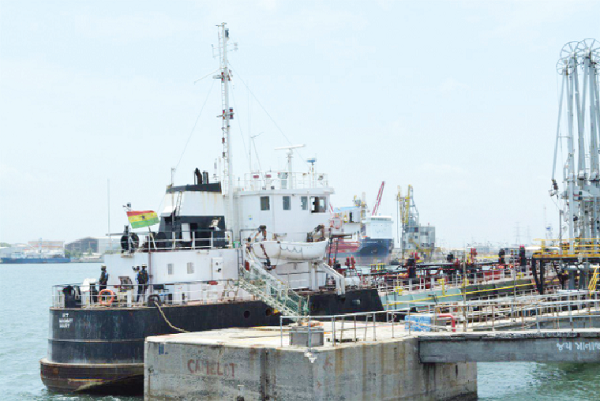
Navy, NPA impound 2 vessels over illegal oil transfer
The Eastern Naval Command and the National Petroleum Authority (NPA) last Saturday impounded two Nigerian oil tankers near the Tema Port for allegedly engaging in ship-to-ship transfer of crude oil without authorisation.
The Nigerian-flagged (registered) vessel of 1,000 tonnes, the MT Mammy Mary, carrying some 3,801 cubic metres of crude oil, which arrived in Ghanaian waters on April 6, 2018 from Nigeria, was transferring the consignment into the receiving tanker the MT Metrix 1, with a cargo capacity of 5,000 tonnes, some five nautical miles from the Tema Port when officials of the Ghana Navy accosted them about 4 p.m. on Friday, April 13, 2018.
At the time of the seizure, the MT Mammy Mary had successfully transferred 2,000 tonnes of crude oil into the MT Metrix 1.
According to the Chief Staff Officer at the General Headquarters of the Ghana Navy, Commodore Yakubu Issah, preliminary investigations revealed that the eight-member crew of Nigerian nationality aboard the MT Mammy Mary had no documentation covering the consignment and could also not readily provide a name for the cargo owner or owners.
The crew in the receiving vessel comprised two Pakistanis and 10 Ghanaians.
Speaking to the media at the oil jetty at the Tema Port where the vessels were towed to as part the of investigations, Commodore Yakubu indicated that for tankers to be able to carry out ship-to-ship transfer of crude oil, there were protocols they ought to have been followed.
Collaborations
The Ghana Navy, he said, was collaborating with other agencies, such as the Ghana Maritime Authority (GMA), the Bureau of National Investigations (BNI) and all relevant agencies, to carry out the necessary investigations into the incident to determine whether the crew had the necessary licences to transact such business in Ghana.
He pointed out that transferring the product on the sea meant that Ghana would have lost out on revenue in taxes on the product.
He said the MT Mammy Mary and the receiving vessel, along with their crew, were being kept under 24-hour surveillance at a berth at the port until investigations were completed.
“It is our hope that the necessary taxes will be recovered on the products once the investigations are concluded,” Commodore Yakubu said.
NPA
The acting Chief Executive Officer of the NPA, Mr Hassan Tampuli, also told the media that a sample of the product had been taken by NPA and an independent inspector, Intertek Ghana, for analysis to confirm the actual product type and specification, although a visual inspection identified the product as crude oil.
The NPA and Intertek, he suggested, measured the quantity on board as 204 cubic tonnes, and the value was to be ascertained once its density had been confirmed after full product laboratory analysis.
The investigations, he said, would also determine whether the product was procured through legal means.
“Initial investigations suggest that Marinemore Consult, which the Captain of the MT Mammy Mary gave as the agent for the vessel, did not have the required licence to engage in oil trading,” Mr Tampuli stated.
Prosecution
He hinted that the crew and persons associated with the activity would be made to face prosecution if found culpable.
The NPA, he said, had initiated court action against a tanker, the MT Woodspirit, which was arrested in 2017 for engaging in a similar activity.
He pointed out that the NPA and its relevant stakeholders had intensified their border monitoring patrols to clamp down on people engaged in border-to-border smuggling, adding: “We are determined to go all out to sanitise the sector.”
“We have launched an operation at the Hamile Border in the Upper West Region where fuel smuggling seems to be on the increase and we are determined to break the chain and ensure that the country will be able to recoup the necessary benefits from oil imports and exports,” Mr Tampuli stressed.
Sounding a note of caution to individuals and companies engaged in illegal transfers of oil from ships to bulk road vehicles (BRV), popularly known as petrol tankers, he stated that the authority would pursue the policy on licence withdrawal seriously to serve as a deterrent to industry players.
